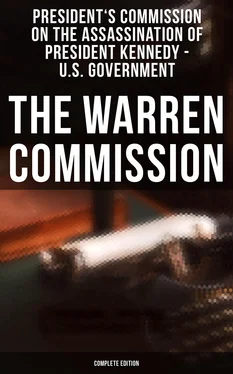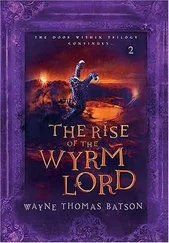Mrs. Oswald. Yes. I am under the impression that probably she—I think Lee is an agent. I have always thought that, and I have as much circumstantial evidence that Lee is an agent, that the Dallas police has that he is a murderer, sir.
Mr. Rankin. What do you base that on?
Mrs. Oswald. Well. I am going to tell my story. I have it all there. That is what I base it on.
Mr. Rankin. Can you tell us in summary?
Mrs. Oswald. No, sir, I don't think I want to tell it to you that way, because I cannot, almost.
Mr. Rankin. That is a very serious charge, that he was an agent, too.
Mrs. Oswald. Well, fine. So all right.
If I feel that way, sir, don't I have the right, the American way, to speak up and to tell you what I feel? Isn't that my privilege?
Mr. Rankin. Yes. But can't you tell us what you base it on?
Mrs. Oswald. Yes, sir, I will, as I go along, sir.
Mr. Rankin. Is that the only way you can tell it?
Mrs. Oswald. I don't see how I can say to you I know he is an agent, and I have papers. I want to tell the whole story. I still have more papers. I have documents that I know you do not have, sir.
Mr. Rankin. Have you told us all that you know that would bear on your claim that Marina Oswald was——
Mrs. Oswald. Had a part in it.
Mr. Rankin. Had a part in it or conspired to assassinate the President?
Mrs. Oswald. Yes, sir—I cannot prove it. And I cannot prove Lee is an agent. I cannot prove these things.
But I have facts that may lead up to them. I cannot prove it, because if I did we would not be having this Commission, sir. I could say who shot President Kennedy.
Mr. Rankin. So in both cases of the agent—Lee being an agent, your son, and Marina Oswald and the Secret Service agents or anybody else conspiring with him for the assassination of President Kennedy, that is just suspicions. You cannot prove it—is that right?
Mrs. Oswald. I would not use the word suspicion, because I am not the type person to be suspicious and imagine things.
You may think so, because I am a woman. And this is my son. But my children were never tied to my apron strings.
And I can prove to you, in his defection in 1959, I made the statement that Lee, as an individual, had the right to think and do what he wanted to. They even said he was a Communist. If that is what he studied, and that is what he wanted to do, I accepted that, because that was his privilege as an individual. And that is public in 1959, my statement, which shows that I am not the sobbing mother kind because he has gone to Russia, and cry about it. I acknowledge that.
I have acknowledged that if the children, like Lee, went to Dallas, as I testified that yesterday, and didn't tell me he was going to Dallas—I don't grieve and lose my sleep over that. I have accepted that fact, because when Lee and Marina got ready to come to me that would be fine. In the meantime, I still have to live.
Mr. Rankin. Are you telling the Commission that your son was part of a conspiracy to assassinate the President?
Mrs. Oswald. I am saying that I realize that my son could possibly be part—yes—I realize he is a human being and he could possibly be in this, yes, sir.
Mr. Rankin. Are you saying he was?
Mrs. Oswald. No, I do not know. I am saying possibly he is involved.
Mr. Rankin. And you are saying possibly Marina was involved?
Mrs. Oswald. Well, exactly what I am trying to say. If I had proof, sir, I would give the proof in an affidavit and this case would be closed, like Mr. Wade said.
But I have as much right to my way of thinking as Mr. Wade has.
Mr. Rankin. You are saying that possibly the Secret Service agents were involved, too? You don't have any proof of that?
Mrs. Oswald. That is exactly what I have been trying to say. I have told you how I was treated, which has given me cause for this particular way of thinking—because I believe that my son is innocent. And I think that is the purpose of this Commission, is to hear all witnesses and arrive at a conclusion. Am I not right, gentlemen?
So this is my way of thinking. So grant me my way of thinking. If I am wrong, fine. But you may learn something.
Mr. Rankin. What about the high official now. Can you tell us who that was?
Mrs. Oswald. No, sir. I wish I did know. I have my own idea about that. I would rather not—because it is a high official—I would rather not give a name.
But I have my own very strong suspicions as to the official who he might be.
Mr. Rankin. We would appreciate your telling us within this group what you think.
Mrs. Oswald. Fine—and I expect to, Mr. Rankin. I am a person that is very outspoken, as you know by now, and I will certainly do that.
But will you grant me the privilege first of finding out the name of the man in the State Department that wrote the letter to Senator Tower, because it is an incorrect—it is incorrect—the whole testimony is incorrect.
Mr. Rankin. We will get that correspondence for you.
Mrs. Oswald. All right. I was going to go into something else, but while we are here, I will continue this.
And this, to me, will be in this line. And I think very important to you gentlemen. And you do not have a copy of what I am going to show you. I am the only person that has this copy.
I am sorry to take time, but these were not copied, sir. We sealed them up, and we were going to have them copied this afternoon. But I can get to this particular one. This is the defection. I have much more testimony than this. I have testimony, sir.
Mr. Rankin. Do you think that you can tell us the name of the high official you spoke about?
Mrs. Oswald. Yes, I think so. And I am going to tell you. But please do not ask me at this particular moment. I do not think this is the proper time for me to—it is just—I have no proof. Understand? As I said, it is my right to think and my analysis of the papers I have. I have papers where I can come to a conclusion, just like you gentlemen are going to have papers and witnesses and come to a conclusion.
Now, this particular instance——
Mr. Dulles. I wonder if we could not possibly explore that agent matter. I am very much interested in that. I cannot be here tomorrow. We laid all the groundwork for that.
The Chairman. Mr. Dulles would like to know her reasons for believing that he was an agent.
Mrs. Oswald. Yes, sir, I have two very long stories.
Mr. Dulles. I have to be absent, unfortunately, tomorrow, so I would like very much to have it.
Mr. Rankin. If you could go into that question, Mrs. Oswald, because Mr. Dulles is not going to be here tomorrow.
Mrs. Oswald. We have everything just so, and yet when we come here we don't have it. The International Rescue Committee is what I am looking for.
I have also the original application from the Albert Schweitzer coming that you gentlemen do not have.
The Chairman. Let's stay on one thing, please.
Mrs. Oswald. All right. I am a little excited now, because I meant to go story by story.
Gentlemen, I have at least four more stories to tell—two I don't think there are some parts you possibly can know about.
Mr. Rankin. Well, if you could tell about why you think your son was an agent, it will help to get that taken care of this afternoon while Mr. Dulles can be with us. That is why I asked you that.
Mrs. Oswald. Yes, sir. We have a special file. You see, gentlemen, all morning long I was in the backroom and we were copying things. We had everything just so. So now I don't know what condition they are in. Mr. Doyle and I worked on the papers again last night and we had them just so. And then when they were copied, evidently they were mixed up again.
Mr. Rankin. We tried to have you present so that would not happen. Mrs. Oswald. I guess you didn't accomplish that.
Читать дальше












